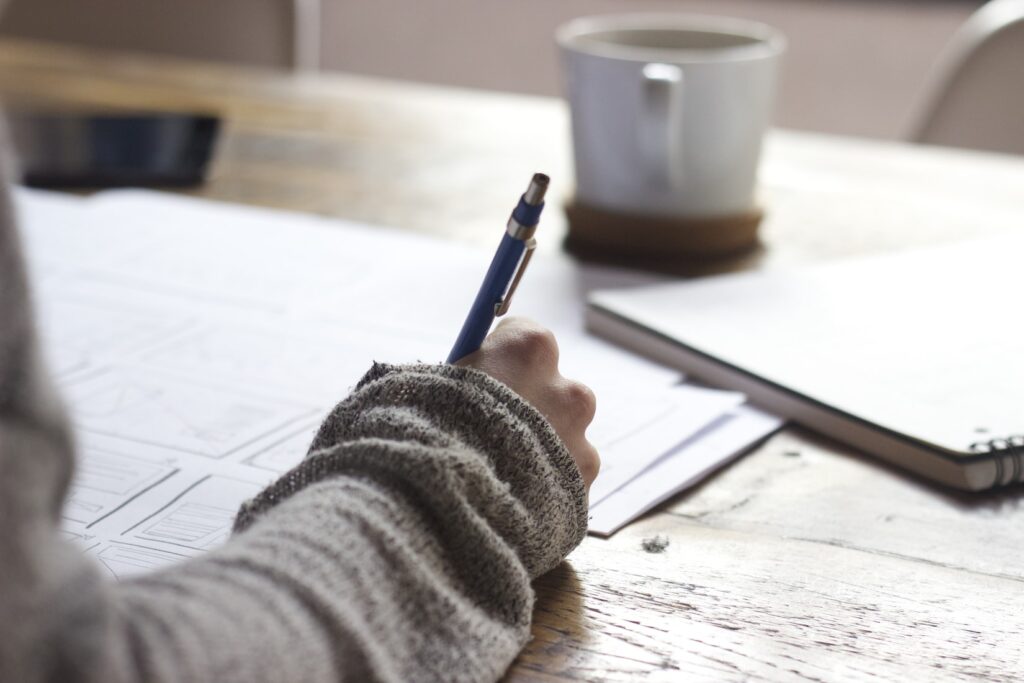
I am resistant to making this strange time of isolation all about productivity and staying busy and pretending like things are anything but normal. They’re not. And that’s OK. It’s also OK to not feel creative, or to feel too overwhelmed to do much. And, if you are a student, or parent of a student, the pressure to keep up with academics can feel overbearingly stressful. That’s all OK.
The practice of Freewriting can help alleviate some of those feelings: writers & non-writers, students & non-students alike.
In fact, dismiss what you even associate with the word “work” or “practice.” Begin to dismantle the conditioning of society and allow yourself to just BE. That doesn’t have to be a negative thing; I know it’s hard. But know, that we can still learn, and create, and heal and produce in this state. Here’s how:
Often, I will begin my classes with a short freewrite or two. Generally, the topic of our freewrite is tied to either what we’ve already been reading and discussing, or ideas and concepts I’m about to introduce to them. The concept is this: for a designated amount of time (I usually do 5, 7, or 10 minute stretches) you just WRITE. You don’t think before you put the pencil to paper; you don’t worry about it being “good” or about grammar or logical organization of your sentences. In fact, the only rule is: don’t stop writing. If you get stuck, I encourage you to literally write random, nonsense words until a thought makes its way down the avenue of your spine and arm and fingers and transfers to the page and a sentence forms. This works as a stream of consciousness: a continuous flow of thinking and writing that may end in a totally different place than you started. Don’t stop writing. Don’t worry about anything else.
Why is this activity so magical? Because it’s freeing. That’s why it’s called a freewrite. Dismiss the pressure to be a “good writer” or that your ideas are not worth writing about. You are. They are. Writing is also cathartic and healing–practicing small, no-pressure activities of reflection can do wonders for your mental health. Just like we don’t need to be well-practiced, flexible yogis to benefit from moving our bodies in an intentional, conscious, healing way…we don’t need to be WRITERS to engage in the healing, reflection, and mental exercise that freewriting offers. The benefits are also practical for learning and keeping our fingers, minds, and thoughts sharp as we improve literacy skills across the board.
FOR YOUNG STUDENTS: keep the activity short (3 or 5 minutes) and choose a happy topic based in reflection of a time period or day. Whether it be their day, their dream, a past holiday or vacation; don’t rely on specifics, but instead encourage open-ended answers with ideas like “What other things or places or moments make you feel Christmas magic when it’s not even Christmastime?” This helps to develop and sharpen skills such as: serial recall, summary, fine motor skill and legibility practice, reflection, and imagination. When they are done writing, ask them to share parts of their freewrite, and to summarize what they wrote about. You can also ask about the process itself as you encourage them to massage their hands and connect with the part of the body that allowed them to write: How did it feel to be able to write without worrying about spelling or grammar? How does your hand feel after writing for so long straight? What kinds of things did writing about this make you wonder about, or want to explore?
FOR OLDER STUDENTS: Start with a short freewrite (5 or 7 minutes) about a general topic: such as, “How do you feel your body has changed since school has closed?” Then, read aloud a short story, article, poem, or passage on the topic (try, “When the Body” by Linda Hogan). End with a longer freewrite (7 or 10 minutes), asking them to reflect on what you read and how it made them feel, connecting to their thoughts about their own body. Remind them to not worry about logic, structure, spelling, or any of it. For teenagers, let them know you won’t even read what they are writing. There is no wrong answer or “bad” writing here. Then, as you encourage them to massage their hands, ask them to summarize what they wrote, and how each freewrite compares before and after the reading. Skills include: handwriting practice, listening and reading comprehension, reflection, oral storytelling, summary and paraphrase, and memory retention. For college students: lead yourself, or ask a friend to do this with you over email or Facetime, or ask a parent to facilitate. You can attach this to your current courses (yes, even math!) or not. Remember, it’s not about directly correlating current academic learning to this activity.
FOR WRITERS: PUT AWAY YOUR CREATIVE PROJECT. Do not tie your freewrite to those. This is like your warmup for a run: do arm circles directly help you run faster? Maybe not literally, but doing them lubricates your joints, warms up your muscles, and gets your heart rate going, and most importantly, mentally prepares you by getting you into the mindset. Don’t force creativity or productivity. Write for 10 minutes at a time, with the same no-pressure rules. You can seek out set flash fiction prompts from Nancy Stohlman (https://nancystohlman.com/20…/…/19/30-flash-fiction-prompts/) OR read curated articles from Roxane Gay’s Unruly Body Series and respond with a reflection on what your read, OR simply reflect on how you are feeling right then, right now. When you are done, don’t re-read it–that will lend to analyzing and editing and correcting, as we writers tend to intrinsically do. You warmed up your creative muscles and will now be thinking and processing for the day thereafter.
FOR NON-WRITERS: Reflective writing helps you process your feelings and emotions without needing to seek out additional resources or people or time, which can be difficult right now. You can consider freewriting like a type of journaling, only more intentional. Still, set a type of prompt or topic or question for yourself before you begin and write that at the top of your page before you set your timer. Don’t feel pressure to write about anything meaningful or directly related to the current crisis–though of course, you may. Think about the weather, about memory, about your body. Build up from 5 minutes to 10 minutes and do this in the morning, or afternoon, or evening. It is a type of meditation and self-reflection: re-read what you wrote and take joy in the process.
FOR EVERYONE: Do NOT type on your laptop! Use a notebook, your grocery list pad of paper on your fridge, blank computer paper, I don’t care. Use a pack of glitter gel pens, an old eyeliner pencil, your kids’ crayons. But you MUST physically use your own hand to write; studies have shown you simply do not benefit in the same way. This is a mind/body process indented to slow you down. Let yourself slow down and feel and write and think and move.
* * * *
Will you try this for yourself or your kids? Let me know how it goes in the comments! Happy writing ✏️❤️

